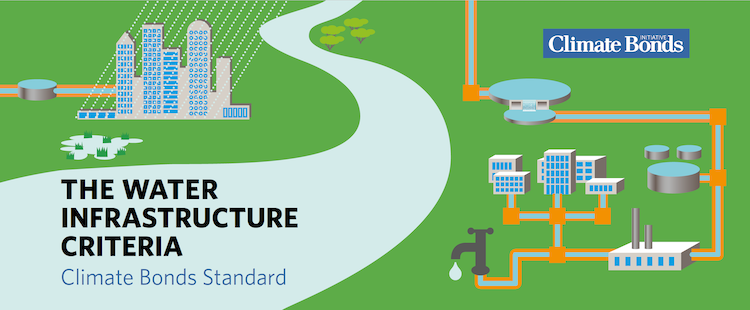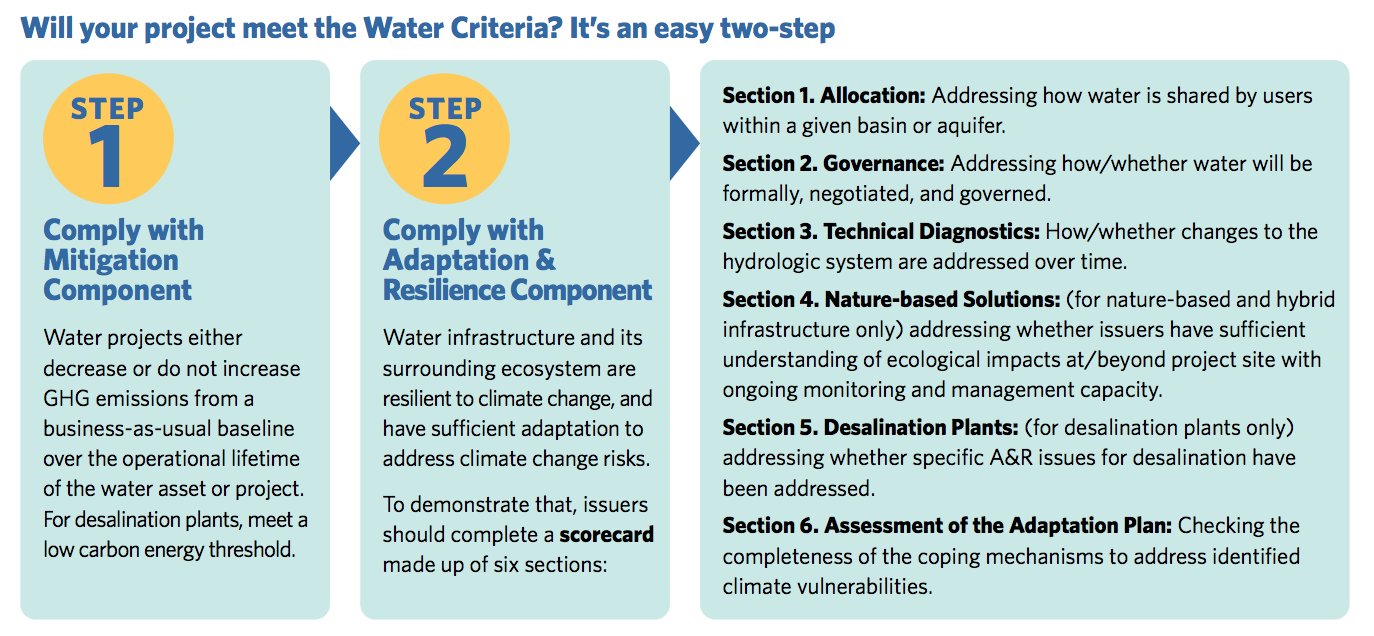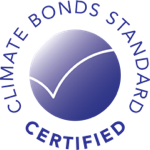
Water Infrastructure Criteria
Water-related investments account for an enormous part of the capital assets of developed countries, and are a huge part of investments being undertaken in developing economies. In 2008, the Intergovernmental Panel on Climate Change (IPCC) report showed the complex links between climate change and the distribution and supply of fresh water. Substantial infrastructure will be required to ensure clean and secure water supplies as the climate changes. A clear understanding of what sorts of investments are consistent with improving the climate resilience of water assets will help bond investors quickly determine the environmental credentials of water-related green bonds.
1. Water Infrastructure Criteria Brochure
2. Water Infrastructure Criteria
3. Water Infrastructure Criteria Background Paper
4. Water Infrastructure Criteria Supplementary Guidance Note for Issuers and Verifiers (include explanations to Adaptation & Resilience Scorecard)
4b. Supplementary Guidance Note for Adaptation & Resilience Scorecard for Desalination Plants (Coming Soon)
5. Water Infrastructure Criteria Frequently Asked Questions (FAQ)
Certifications
To see the whole list of Water Infrastructure Climate Bonds, visit our Database of Certified Bonds
Timeline of development:
February 2021: Phase 3 Criteria released (desalination re-added)
February 2020: Water Desalination removed temporarily
May 2018: Full Criteria released
Dec 2017: public consultation closed
Oct 2017: Phase 2 Criteria public consultation opens
Oct 2016: Phase 1 Criteria released
Articles
Financing Water Resilience: Climate Bonds for China (China Water Risk)
Financing Natural Resilience: a New Wave (UNESCO)
China's Green Bonds Finance Climate Resilience (New Security Beat)
Water Fit to Finance (World Water Council)
The Water Infrastructure Criteria lay out the requirements that water infrastructure assets and/or projects must meet to be eligible for inclusion in a Certified Climate Bond. The bond must also meet the reporting and transparency requirements of the overarching Climate Bonds Standard in order to receive Certification.
Climate Bonds Water Infrastructure Criteria have been developed in three phases. Phase 1 Criteria covers engineered water infrastructure and Phase 2 Criteria covers nature-based and hybrid water infrastructure for such purposes as water collection, storage, treatment and distribution, flood protection and drought resilience. The addition of Desalination Criteria marks the third phase of Criteria development. These three phases now form the whole Criteria and there is no division between the three.
Development of Water Infrastructure Criteria
The development of the Water Infrastructure Criteria has been led by the Water Consortium, which consists of the Climate Bonds Initiative, Ceres, World Resources Institute (WRI), CDP and the Alliance for Global Water Adaptation (AGWA), which is supported by Stockholm International Water Institute (SIWI). To create the Criteria, the Water Consortium convened a Technical Working Group (TWG) and an Industry Working Group (IWG) with representatives from investors, public utilities, water NGOs and international policy bodies from around the world.
An additional Desalination TWG was convened to develop the desalination criteria added in phase 3 of Criteria development.
KR Foundation and Rockefeller Foundation have kindly supported this work.
 |
 |

Status: The Water Infrastructure Criteria is available for use in certifications. Get in contact with certification@climatebonds.net to start the certification process of your Water Infrastructure green bond.
Financial instruments (bonds and loans) linked to these eligible assets, activities and entities will be aligned with the Paris Agreement and the goal of keeping global temperature rises to no more than 1.5oC above pre-industrial levels.
The new Water Infrastructure Criteria was launched on 22 May 2018. See the Media Release for more details.
A Webinar ‘A Deeper Blue for Green Bonds: Water Investment Criteria for Nature-based Solutions’ was held on June 14 2018.
A webinar was held in November 2017 to launch the Phase 2 Public Consultation. The recording is below:
Water Infrastructure Criteria Technical Working Group Members
|
Lead Specialist
|
 |
|
Alliance for Global Water Adaptation |
 |
 |
 |
 |
 |
| World Bank Group's Environment & Natural Resources Global Practice Valerie Hickey |
California Organized Investment Network (COIN) Peter Streit Investment Officer |
European Investment Bank Nancy Saich Senior Advisor on Climate Action & Environment |
UNESCO-IHE Prof. Michael McClain Professor of Ecohydrology |
World Business Council for Sustainable Development Tatiana Fedotova Manager, Water Cluster |
 |
 |
 |
 |
 |
| University of North Carolina Dr. Larry Band Director, Institute for the Environment |
Tetra Tech Dan Christian Senior Water Resource Engineer |
Deltares Cees van de Guchte Scenarios & Policy Analysis |
American Water Works Association Cynthia Lane Director of Engineering & Technical Services |
IUCN Global Water Programme Dr. James Dalton Coordinator Global Water Initiatives |
 |
 |
 |
 |
 |
| UNEP-DHI Partnership Maija Bertule Programme Advisor |
Alliance for Global Water Adaptation Christine Chan |
Ceres Monika Freyman Director, Water Program |
World Resources Institute Todd Gartner Director, Natural Infrastructure Initiative |
Stockholm International Water Institute John Joyce Chief Economist, Water Economics |
 |
 |
 |
 |
 |
| UNEP Dr. Musonda Mumba Ecosystem Based Adaptation (EBA) Flagship Programme Coordinator |
Water Innovator Will Sarni |
Earth Security Group Margot Hill Clarvis Senior Manager |
Organica Water Ari Raivetz CEO |
Stockholm International Water Institute Torgny Holmgren Executive Director |
 |
 |
 |
 |
|
| Charles River Watershed Association Robert Zimmerman Executive Director |
Bioatlatlantic Institute Marco Follador Director of Adaptation Planning |
University of California, Division of Agriculture & Natural Resources Ted Grantham Cooperative Extension Specialist in Climate & Water |
Denver Water Laurna Kaatz Climate Scientist |
Complutense University of Madrid Dr. Elena Lopez-Gunn
|
 |
 |
 |
 |
 |
| 2030 Water Resources Group (hosted by IFC) Rochi Khemka Regional Coordinator |
Conservation International Dave Hole Senior Director, Global Synthesis |
US Geological Survey Janet Cushing Deputy Chief, National Climate Change & Wildlife Science Center |
Independent Consultant Benjamin Denjean |
The Nature Conservancy Jorge Gastelumendi Senior Policy Advisor |
 |
 |
 |
||
| Arup Jason Fairbairn Associate, Hydrogeologist and Water Resources |
Global Environment Facility Christian Severin Senior Environmental Specialist |
Southern University of Science and Technology, Shenzhen, China Junguo Liu Professor |
U.S. Environmental Protection Agency Lisa Hair Senior Environmental Engineer |
U.S. Army Corps of Engineers Debbie Larson-Salvatore Institute for Water Resources |
 |
 |
 |
 |
 |
| U.S. Army Corps of Engineers Charles B Chestnutt Institute for Water Resources |
The Nature Conservancy (TNC)
|
RAMSAR Ania Grobicki |
World Resource Institute (WRI) Betsy Otto |
American Water Works Association (AWWA) Bill Stannard |
 |
 |
 |
 |
 |
| University of Massachusetts, Hydrology Casey Brown |
CDP Cate Lamb |
Urban Water Research Group, Imperial College London Cedo Maksimovic |
AMWA Erica Brown |
Pegasys, South Africa Guy Pegram |
 |
 |
 |
 |
 |
|
Ceres |
Colorado State University, Stream Ecology Lab LeRoy Poff |
Wiselion LLC |
Water Environment Federation |
DC Water |
 |
 |
 |
 |
 |
| RAMSAR Rob Cadmus |
European Investment Bank Sebastian Hyzyk |
Ceres Sharlene Leurig |
European Investment Bank Stefanie Lindenberg |
Asia Development Bank Thomas Panella |
 |
||||
| OECD Xavier LeFlaive |
Water Infrastructure Criteria Industry Working Group Members
| Mike Brown, San Francisco Public Utilities Commission | Paul Fleming, Seattle Public Utilities |
| Cameron Ironside, International Hydropower Association | Piet Klop, PGGM |
| Hannah Leckie, OECD | Arturo Buenaventura Pouyfaucon, Abengoa Water S.A. |
| Jessica Robinson, Asria | Eric Schellekens, Arcadis |
| Manisha Singh, Wiselion LLC | Paul Wood, Water Fund LLC |
| Matthew Kuzma, Organica Water | Martin Geiger, DEG |
| Bob Morgan, Beaver Water District | Nicole Hardiman, Illinois River Watershed Partnership |
| Simon Petley | Roman Gomez, IFC |
| Gary Sharkey, PwC UK | Chris Webb, HERRERA |
| Adam Carpenter, American Water Works Association | Monica Reid, Kestral Consulting |
| Anais Blasco, WBCSD |
Desalination Criteria Technical Working Group Members
 |
 |
 |
 |
 |
|
Water Desalination and Reuse Center, KAUST |
Renewables 100 Policy Institute Angelina Galiteva Founder and Board President |
Pacific Institute Heather Cooley Director of Research |
University of Utrecht Edward Jones PhD |
International Energy Agency Molly Walton Energy Analyst |
For industry input, special thanks go also to Tom Pankratz, independent consultant and the editor of Global Water Intelligence's weekly Water Desalination Report.
Disclaimer: The Climate Bonds Standard Board operates legally as an advisory committee of the Climate Bonds Initiative Board and oversees the development of the Climate Bonds Standard. Neither the Climate Bonds Standard Board nor any organisation, individual or other person forming part of, or representing, the Climate Bonds Standard Board (together, "CBSB") accepts or owes any duty, liability or responsibility of any kind whatsoever to any issuer which wishes to apply for any of its bonds to be certified under the Climate Bonds Certification Scheme ("Scheme"), or to any issuer whose bonds may at any time be certified under the Scheme or to any other person or body whatsoever, whether with respect to the award or withdrawal of any certification under the Scheme or otherwise. All advice or recommendations with respect to any certification under the Scheme or otherwise that CBSB provides to the Climate Bonds Initiative Board is provided to it in an advisory capacity only and is not to be treated as provided or offered to any other person.
Financial instruments (bonds and loans) linked to these eligible assets, activities and entities will be aligned with the Paris Agreement and the goal of keeping global temperature rises to no more than 1.5oC above pre-industrial levels.
